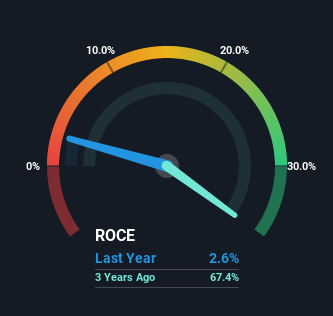- United States
- /
- Entertainment
- /
- NasdaqCM:CPOP
Pop Culture Group (NASDAQ:CPOP) Could Be Struggling To Allocate Capital
What trends should we look for it we want to identify stocks that can multiply in value over the long term? One common approach is to try and find a company with returns on capital employed (ROCE) that are increasing, in conjunction with a growing amount of capital employed. Ultimately, this demonstrates that it's a business that is reinvesting profits at increasing rates of return. However, after briefly looking over the numbers, we don't think Pop Culture Group (NASDAQ:CPOP) has the makings of a multi-bagger going forward, but let's have a look at why that may be.
What Is Return On Capital Employed (ROCE)?
Just to clarify if you're unsure, ROCE is a metric for evaluating how much pre-tax income (in percentage terms) a company earns on the capital invested in its business. To calculate this metric for Pop Culture Group, this is the formula:
Return on Capital Employed = Earnings Before Interest and Tax (EBIT) ÷ (Total Assets - Current Liabilities)
0.026 = US$1.4m ÷ (US$64m - US$10m) (Based on the trailing twelve months to June 2022).
So, Pop Culture Group has an ROCE of 2.6%. In absolute terms, that's a low return and it also under-performs the Entertainment industry average of 8.4%.
View our latest analysis for Pop Culture Group

While the past is not representative of the future, it can be helpful to know how a company has performed historically, which is why we have this chart above. If you're interested in investigating Pop Culture Group's past further, check out this free graph of past earnings, revenue and cash flow.
How Are Returns Trending?
On the surface, the trend of ROCE at Pop Culture Group doesn't inspire confidence. Around five years ago the returns on capital were 16%, but since then they've fallen to 2.6%. Although, given both revenue and the amount of assets employed in the business have increased, it could suggest the company is investing in growth, and the extra capital has led to a short-term reduction in ROCE. If these investments prove successful, this can bode very well for long term stock performance.
On a side note, Pop Culture Group has done well to pay down its current liabilities to 16% of total assets. That could partly explain why the ROCE has dropped. Effectively this means their suppliers or short-term creditors are funding less of the business, which reduces some elements of risk. Since the business is basically funding more of its operations with it's own money, you could argue this has made the business less efficient at generating ROCE.
The Bottom Line On Pop Culture Group's ROCE
While returns have fallen for Pop Culture Group in recent times, we're encouraged to see that sales are growing and that the business is reinvesting in its operations. These growth trends haven't led to growth returns though, since the stock has fallen 36% over the last year. So we think it'd be worthwhile to look further into this stock given the trends look encouraging.
On a final note, we found 3 warning signs for Pop Culture Group (1 shouldn't be ignored) you should be aware of.
While Pop Culture Group may not currently earn the highest returns, we've compiled a list of companies that currently earn more than 25% return on equity. Check out this free list here.
New: Manage All Your Stock Portfolios in One Place
We've created the ultimate portfolio companion for stock investors, and it's free.
• Connect an unlimited number of Portfolios and see your total in one currency
• Be alerted to new Warning Signs or Risks via email or mobile
• Track the Fair Value of your stocks
Have feedback on this article? Concerned about the content? Get in touch with us directly. Alternatively, email editorial-team (at) simplywallst.com.
This article by Simply Wall St is general in nature. We provide commentary based on historical data and analyst forecasts only using an unbiased methodology and our articles are not intended to be financial advice. It does not constitute a recommendation to buy or sell any stock, and does not take account of your objectives, or your financial situation. We aim to bring you long-term focused analysis driven by fundamental data. Note that our analysis may not factor in the latest price-sensitive company announcements or qualitative material. Simply Wall St has no position in any stocks mentioned.
About NasdaqCM:CPOP
Pop Culture Group
Pop Culture Group Co., Ltd hosts entertainment events to corporate clients in China.
Slight risk and slightly overvalued.
Market Insights
Community Narratives



